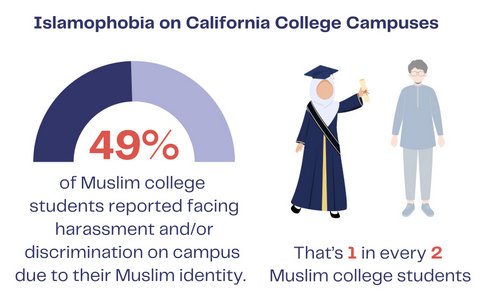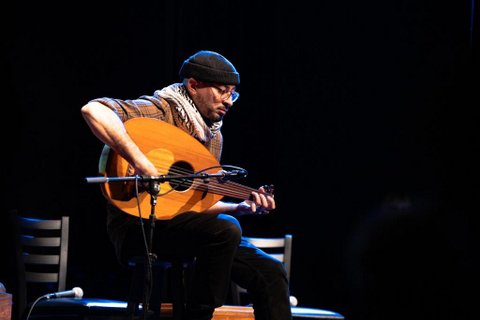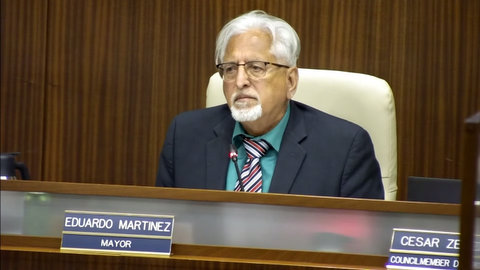
22 Nov New Report Reveals Skyrocketing Rates of Islamophobia on State’s College Campuses

Graphic showing rate of harassment and discrimination faced by Muslim college students on California campuses due to their religious identity. Data from the 2024 Campus Climate Report conducted by the Council on American-Islamic Relations California and the Center for the Prevention of Hate and Bullying released on Nov. 19. (Alise Maripuu / Bay City News)
By Alise Maripuu
Bay City News
Since the Oct. 7, 2023, attack that sparked the Israel-Hamas war, Muslim students on college campuses throughout California have endured surging rates of Islamophobia, according to a 2024 Campus Climate Report released by the Council on American-Islamic Relations California, or CAIR-CA.
Out of the 720 California college students surveyed for the report from March to July of this year, “one out every two students reported facing harassment or discrimination on campus because of their Muslim identity,” said Jeffrey Wang in a Tuesday press conference about the report.
Wang is a senior civil rights attorney for the Bay Area chapter of CAIR-CA. On Tuesday, he joined two Muslim students, Iman Deriche of Stanford University and Zaid Yousef of University of California, Berkeley, to discuss the findings of the report with journalists at the chapter’s headquarters in Santa Clara.
Ninety-two percent of the students who reported that they experienced Islamophobia on their college campus said it occurred after the Hamas-led attack on Israel and subsequent bombardment of Gaza by Israeli forces, according to the report.
Deriche and Yousef described their personal experiences of being harassed on their college campuses because of their Muslim identities.
“As escalations continue in Palestine and Lebanon, here in the U.S. this rise of anti-Arab and anti-Muslim hate has skyrocketed,” Deriche said, adding that her school has been no exception.
Deriche, who wears a hijab, said she began facing a rise in bullying and harassment at Stanford for being Muslim soon after the start of the war .
“The first incident happened in mid-October last year,” she said. “I and others were talking around campus and while doing that, we were followed by Zionists. They took photos, screamed for us and asked for our names to dox us,” said Deriche. “Just a couple of days after that, I and two other Muslims were verbally and physically assaulted by a Zionist student on campus while we were putting up and removing posters.”
Female students, especially those wearing hijabs or other head coverings, underwent higher rates of Islamophobia compared to their male counterparts, according to the report.
Nearly half of the survey’s respondents who faced religious discrimination or bias said they were not comfortable reporting their concerns to their schools out of fear of being further targeted. Of the students who did report incidents of harassment or discrimination to their school, almost all of them said their school’s response was not appropriate, the report found.
Deriche is among those students who criticized Stanford’s reactions when students brought their concerns and experiences of Islamophobia.
“Stanford has failed to take any meaningful action or address these issues. Even after reporting these incidences to the university, I, along with many other Muslim, Arab and Palestinian students on campus felt invisible since our concerns were just being completely dismissed,” she said.
Luisa Rapport, a spokesperson for Stanford, did not address Deriche’s statements specifically when asked for a response. Rapport said that “the university is committed to providing a safe, supportive and harassment-free environment for our students.”
Deriche also explained how Stanford’s disciplinary actions such as suspension against several students who participated in protests led her to feel scared to express her political and religious thoughts. In June, 13 students were arrested and suspended for barricading themselves in the university president’s office during a protest.
“At the same time we felt hyper-visible as we faced increased systemic surveillance and targeting,” Deriche said. “At times, it felt like we were losing our minds. The fear and anxiety I experience every time I leave my dorm has been overwhelming since last year.”
There have been multiple pro-Palestinian rallies at Stanford since the beginning of the war. Hundreds of students set up tents on campus and camped overnight for months in protest of the war and Stanford’s ties to companies that have investments in Israeli entities.
>>>Read: Protestors Accuse Chevron of Environmental Racism in Palestine and Richmond<<<
Because Stanford is a private institution, the university is not required to publicly disclose its investments, has greater authority to take actions against protesters and can set stricter guidelines for how, when and where protests are conducted.
A few days after the school year began in September of this year, the university announced updates to its rules that set limitations on protests. For example, the policies ban overnight camping and also requires protesters to remove their face masks for identification if they violate Stanford’s Policy on Campus Disruptions.
Those who disrupt university activities like classes and ceremonies or obstruct the movement of any person on campus “are subject to disciplinary action,” according to Stanford’s policy.
“Just this past fall, Stanford escalated its repression by changing its free speech policy under the guise of security measures,” Deriche said. “These changes restrict free speech to specific times of day, one specific designated location on campus, and had an added requirement for students to remove face masks for identification purposes. It’s clear that these disciplinary action and restrictive policies are just scare tactics aimed at silencing pro-Palestinian advocacy, particularly targeting Muslims who are easily profiled.”
The White Plaza on Stanford’s campus is a designated area for spontaneous protesting allowed between 8 a.m. and 10 p.m. The policy updates also added four other locations where demonstrations can occur, but they have to be registered in advance, according to Stanford’s Freedom of Expression website.
Across the Bay at UC Berkeley, Muslim and Arab students have also been facing rising rates of religious discrimination, according to the report.
Eighty-five percent of respondents from UC Berkeley reported experiencing Islamophobia, the highest out of the 87 college campuses surveyed throughout the state. Of those UC Berkeley students, 95% of them said that they endured the anti-Muslim harassment after Oct. 7.
“What distinguishes Islamophobia at Berkeley from other forms of hatred is that Islamophobia is institutionalized,” said Yousef, who is president of the Muslim Student Association at the school. “Muslims are made to feel that our gatherings and protests are inherently violent and unwanted.”
Like Stanford, students at UC Berkeley have conducted similar sit-in protests, erecting hundreds of tents on campus.
Being the president of the Muslim Student Association, Yousef said that he has seen the worst of Islamophobia at UC Berkeley.
“An unfortunate aspect of serving on the board of the Berkeley Muslim Student Association is having firsthand experiences of Islamophobia,” Yousef said. “My friends and myself were being hounded by Zionists, called ISIS terror supporters and rapists for wearing traditional Islamic attire to our Friday prayers.”
Eighty-eight percent of Muslim respondents from UC Berkeley reported feeling targeted by students because of their religious identity compared to the average of 53% across the 87 California colleges surveyed.
But 71% also said they felt that professors and instructors at UC Berkeley were unfairly singling them out for their Muslim identity compared to the average of 37% at the other schools in the state, according to the report.
“As we returned to campus this year, we were met with blatant Islamophobia before the school year even began,” Yousef said. “As two UC Berkeley staff members were conversing about whether or not to grant MSA a space to use for Friday prayers, one staff member accidentally CC’d us on one of their email threads. In the email, the facilities manager of our typical space remarked how another staff member, ‘didn’t want anything to do with them.’ ”
Dan Mogulof, a UC Berkeley spokesperson, said in an email that “UC Berkeley is aware of this report and we remain committed to doing all that we can so that every student, regardless of their origins, identity, or perspectives, can feel safe, welcome and respected.”
Mogulof also referred to a recent video message from Chancellor Rich Lyons in which Lyons condemned speech that calls for violence but also acknowledged that the First Amendment can prevent the school from taking disciplinary action.
“To be clear, even terrifying rhetoric can be protected by the First Amendment and so the challenges we face cannot be countered by dictate or direction from the administration,” Lyon said. “We need to stand up as a community and implore those who call for violence, who use threatening or hateful language, to consider the inherent danger in their words.”
In conjunction with a surge in harassment against Muslim and Arab Americans following the 9/11 terror attacks, the recent rise in anti-Muslim discrimination on college campuses after Oct. 7, 2023, has made Islamophobia a common part of the lives for many Muslims living in the United States, Yousef said.
“We live in a world where Islamophobia is so normalized that even Muslims sometimes feel that it is normal,” Yousef said. “The casual life of a Muslim entails Islamophobia almost every level.”
Despite the increase in Islamophobia on college campuses in California, Yousef is optimistic that the Muslim community will receive outside help from its supporters in the Bay Area.
“There’s definitely uncertainty about what the future will bring. But at the same time, we do have hope in our allies,” Yousef said. “We have hope in our community, in our institutions, in organizations like CAIR, who are doing amazing work to protect our rights and we hope to keep fighting the good fight.”
Copyright © 2024 Bay City News, Inc. All rights reserved. Republication, rebroadcast or redistribution without the express written consent of Bay City News, Inc. is prohibited. Bay City News is a 24/7 news service covering the greater Bay Area.






No Comments